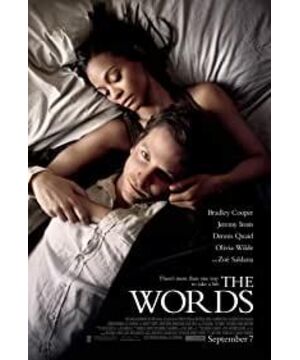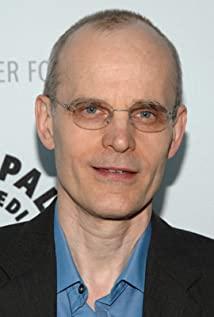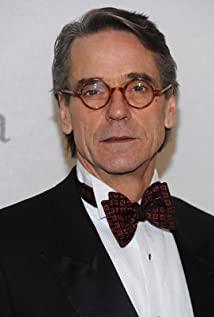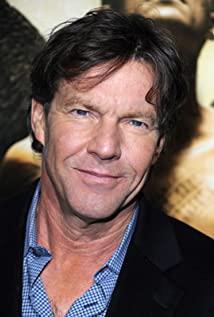(Spoiler) Some writers have written life into their works and made masterpieces. If they operate the other way around, is it "the God incarnate"? This is the subject of " The Words " ( The Words ) that was highlighted at the end. It was just a little bit too abrupt to the ending, and when it raised questions to the audience, it slightly interfered with the appeal of the first half of the story.
At first glance, "Literature Desire" may not be very creative, although it has a special narrative structure and bridge paragraphs. "The Desire of Words" adopts the triple structure of "the story in the story": in the outermost layer, there is a famous writer Clay whose new work is called The Words just like the title of the play. The protagonist of the novel is also written by Rory, but nobody Appreciation, his story is the second part and the main part of the whole play. Rory and his wife, Dora, live in a factory building. They are not afraid of being poor, but no one cares about the work they have written, and the rejection letter is heavier than the bill. At this time, the temptation came—perhaps it was harder for people with ideals to resist—Rory accidentally got a stack of dilapidated manuscripts of the novel, a masterpiece, but the author is no longer available for examination. Dora thought it was Rory's work and encouraged him to publish it. Then he would make the mistake and become famous in one fell swoop. But at this time, the real owner of the manuscript came back to him and told Rory that the story behind the novel was his personal experience, and that was the third narrative in the movie. On the whole, the idea of this drama is "familiar". There are many precedents of "multi-level narrative". In recent years, Hong Kong has also produced "Rebirth" (2009), which is based on the entanglement of life and words. Subject; In addition, there is a German film Lila, Lila (2009) used in the bridge segment of "pretending to be the author of the dilapidated manuscript, and the author will come back after becoming famous" . However, regardless of the mistakes in the ending, the overall movie is still quite touching.
The director also has no intention of doing any narrative experiment. The three-level story is laid out neatly and directly, so that people can see clearly. Then the focus is still on the theme of the story. The original author of the manuscript was very old when he found Rory, but he was not trying to expose the lies publicly and take back the fame and fortune brought by the masterpiece. At this point, the film is separated from the works that compete for the name of the author and the power of writing. People often compare the relationship between the author and the work with the relationship of "creator-creative" or "parent-child". So some works will imagine what would happen if the character had his own will and wanted to fight against the author; for example, the protagonist of "A Bizarre Story" (2006) finds that he is just a character in a novel, and the ending is death, so he crosses to "reality." The world, please let the author let him go. "Literature Desire" explores the relationship between the author and the work more realistically; that dilapidated novel is the only work of the author in his life, because it is a part of his life that he put his life in to write. What do you say? He was originally an American soldier, participated in the reconstruction of Europe after World War II, fell in love with a girl in France, and married and gave birth there. Originally happy and happy, but the child died and his wife was so sad that she wanted to go back to her natal house, leaving a soldier behind. When he was depressed, he began to write verbatim his love for his wife on the typewriter, and took it to her natal home for her to read it. The words made of life made his wife change her mind, but when she returned, she left the manuscript on the train. Because of this, Dabing got a thorn in his heart, and later couldn't help abandoning his wife and go back to the United States.
Many years later, he regretted it. The publication of the old work gave him the opportunity to confess-instead of trying to get his own from Rory, he gave him a more complete story, the experience of his life. Even though Rory was upset, he couldn't look back, and continued to lie to the readers. What is hateful is that he confirms that his hand-written works are never as good as the Dabing's novels, and Dora has a grudge with him when he knows the truth. But wasn't he writing to satisfy Dora at the beginning? And he never got the satisfaction of "writing a touching work." What is the meaning of writing?
The end of the film is a narrative of "reality". Clay, the author of the novel The Words , took a female graduate student home, toasted and talked about Rory's story overnight before the romance. The female graduate student was dissatisfied that the ending did not give Rory a moral trial-"At least it should be written that he couldn't sleep." But Clay said that fictional novels are different from real life, and the graduate student was convinced (a bit reluctant) and kissed deeply. ─At this moment, the scene where Rory and Dora kissed but felt lost in the novel flashed, and Clay let go of the girl and stepped back. This turning point is quite sudden, and then the movie ends in a hurry, and the audience can only interpret it by their imagination. The contrition of the American soldier is that he does not own the work, because the love of his wife is the source of the writing. Writing is what he pours into his life, but it is not as important as when his wife goes home. For Rory, he believes that the achievements of writing can bring happiness to the two. He is a mediocre, and he wants to be recognized by others; he has stolen others' life experience to become famous, but how can he be more important than Dora, who will never leave him? Dora has long been the one who identified with him and believed in him.
The film did not explain whether Clay wrote his own experience as Rory's story, but when he kissed a female graduate student, he was shocked by his own work-can it be regarded as the opposite of "the author writes himself into the work", that is, the work In turn affected the author? Then fiction becomes reality. If you compete for the "author's name" and insist that creators have complete control over the work, it comes from the creative concept of "write yourself in"; but American soldiers and Rory are because of the love and favor of others (including the soldiers' tolerance of Rory, All things outside the author themselves) have their "works", so they cannot have complete control over the "works." On the contrary, the words, which are external things, have the opportunity to reversely influence the author. The central topic of "Literature Desire" is not about the author's power, but about how the love of the other makes the "author".
(Originally published in Times Forum 1318 Issue 2.12.2012)
View more about The Words reviews











